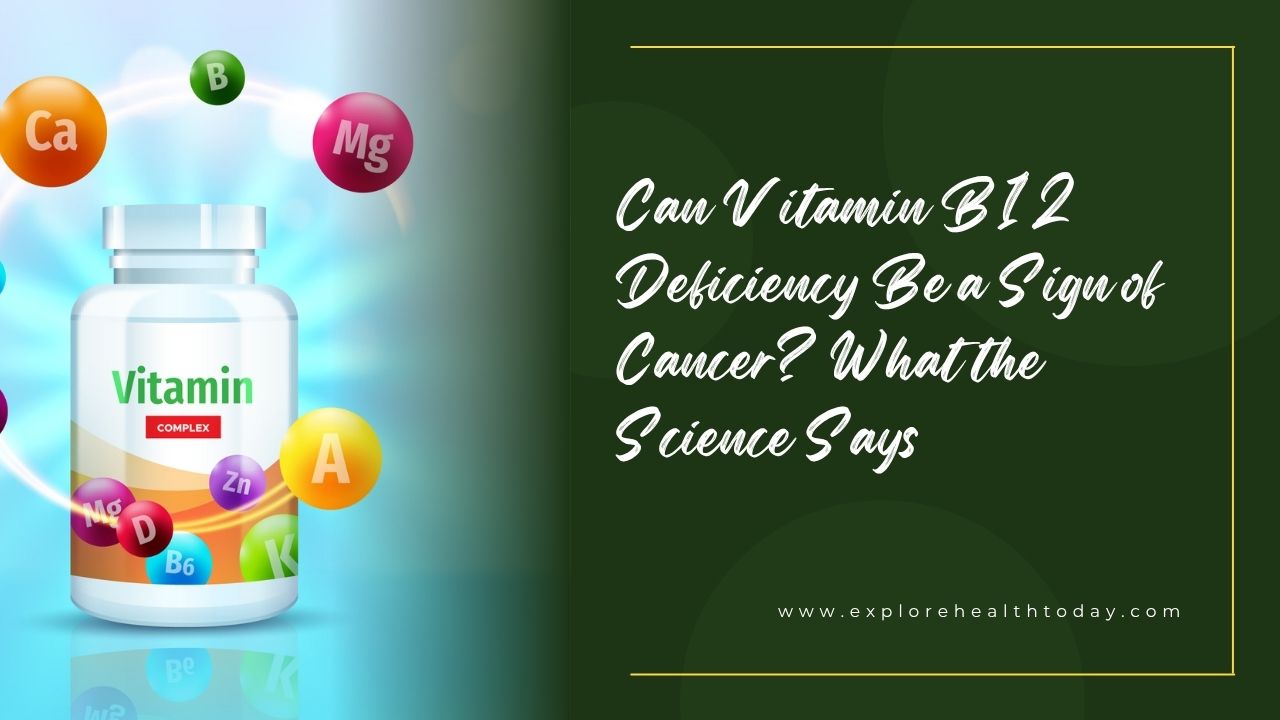Feeling constantly tired, foggy, or weak? If your doctor mentioned a vitamin B12 deficiency, you might be wondering what it really means—and whether it could be pointing to something more serious, like cancer. It’s a valid concern, especially with rising awareness of how subtle signs can hint at bigger health issues.
In this article, we’re exploring the question: can vitamin B12 deficiency be a sign of cancer? We’ll look at the research, current U.S. health data, and what medical experts say about the connection. Whether you’re managing low B12 levels or trying to understand your risks, this guide has you covered.
What Is Vitamin B12 and Why Does It Matter?
Vitamin B12, also called cobalamin, is essential for red blood cell production, DNA synthesis, and neurological function. Since our bodies can’t produce it, we get it from foods like meat, eggs, and dairy—or supplements.
A deficiency can lead to:
- Fatigue
- Numbness or tingling
- Difficulty concentrating
- Mood changes or depression
- Pale or yellowing skin
Can Vitamin B12 Deficiency Be a Sign of Cancer?
The short answer? In some cases, yes—but not always. A B12 deficiency on its own doesn’t automatically indicate cancer. However, certain cancers can either cause or be associated with B12 deficiency, particularly those affecting the digestive system.
Cancers Most Commonly Linked to B12 Deficiency:
1. Stomach (Gastric) Cancer
A long-term B12 deficiency is often caused by pernicious anemia, an autoimmune condition that damages cells in the stomach lining. This damage reduces intrinsic factor, a protein necessary to absorb B12. Studies show that people with pernicious anemia have a 6- to 7-fold increased risk of gastric cancer.
➡ Learn more from the National Cancer Institute.
2. Pancreatic Cancer
The pancreas helps regulate B12 absorption. Pancreatic tumors or damage can impair this process, resulting in low B12 levels, often alongside weight loss and digestive issues.
3. Colorectal Cancer
Emerging evidence suggests a complex relationship between low B12 levels and colorectal cancer, although the exact cause-and-effect remains under investigation.
4. Blood Cancers (e.g., Leukemia, Lymphoma)
Some blood cancers may cause rapid cell turnover or affect bone marrow function, both of which can result in deficiencies—including B12.
U.S. Trends and Data (2024–2025)
According to the CDC’s National Health and Nutrition Examination Survey (NHANES), up to 6% of adults under 60 and 20% of those over 60 in the U.S. are B12 deficient. With aging populations and changing diets, B12-related health concerns are growing in the U.S., especially among vegans, older adults, and people taking certain medications like metformin or proton pump inhibitors (PPIs).
In 2024, a study published in JAMA Oncology highlighted the importance of screening for nutrient deficiencies in patients undergoing cancer treatment, as nutritional imbalances like low B12 can worsen fatigue and recovery time.
Other Common Causes of B12 Deficiency
Before assuming the worst, it’s important to know there are many non-cancer causes of vitamin B12 deficiency:
- Poor diet (especially vegan/vegetarian without supplementation)
- Malabsorption issues (Crohn’s disease, celiac disease)
- Long-term use of acid-reducing drugs
- Weight-loss surgery (gastric bypass)
- Alcohol abuse
- Autoimmune diseases (e.g., pernicious anemia)
In these cases, B12 deficiency is treatable and manageable with the right interventions.
Signs You Shouldn’t Ignore
If you’re experiencing a combination of these symptoms, especially without clear explanation, talk to your doctor:
- Persistent fatigue even with rest
- Unexplained weight loss
- Ongoing digestive issues
- Numbness or tingling in hands/feet
- Memory or concentration problems
- Shortness of breath
- Pale or jaundiced skin
While these don’t confirm cancer, they’re enough to warrant further blood work and imaging.
How Is B12 Deficiency Diagnosed?
Doctors typically start with a blood test to measure B12 levels. If results are borderline or if symptoms are severe, further tests might include:
- Methylmalonic acid (MMA) and homocysteine levels (more sensitive indicators)
- Intrinsic factor antibodies (to check for pernicious anemia)
- Endoscopy or colonoscopy (to investigate digestive causes)
- CT scans or biopsies (if cancer is suspected)
Early detection makes a huge difference—especially if cancer is involved.
Treating Vitamin B12 Deficiency
Treatment Options Include:
- Oral supplements (cyanocobalamin or methylcobalamin)
- B12 injections, especially for people with absorption issues
- Dietary changes, including fortified cereals, dairy, meat, or B12-enriched plant-based milk
Note: If cancer is the root cause, B12 treatment is only part of a broader care plan. Addressing the underlying disease is essential.
Is B12 Supplementation Safe?
Yes—B12 is water-soluble, meaning excess amounts are excreted in urine. Side effects are rare, even at high doses. However, it’s still important to follow medical guidance, especially if you’re taking other medications or have chronic conditions.
You can read more about safe supplement use on the Office of Dietary Supplements – NIH website.
Final Thoughts: When to Be Concerned
So, can vitamin B12 deficiency be a sign of cancer?
Yes—but it’s not the most common reason. Most B12 deficiencies are caused by diet, medication use, or autoimmune conditions, not cancer. Still, if you’re experiencing persistent symptoms without explanation, don’t ignore them.
Your best move? Get tested, understand the root cause, and follow up with your doctor. Early action can rule out serious conditions—or catch them early enough for successful treatme
If you’re experiencing symptoms of B12 deficiency, don’t guess—get a blood test and talk to a healthcare provider. And if you have risk factors like digestive issues, autoimmune disease, or a family history of cancer, it’s even more important to be proactive.
Stay informed, stay curious, and take care of your health—one step at a time.
About ExploreHealthToday.com
ExploreHealthToday.com was created to be a one-stop resource where readers can find up-to-date, well-researched articles on a variety of health topics. From nutrition and wellness to lifestyle and mental health, we strive to provide reliable information to help you make informed decisions about your well-being.
We believe that good health starts with good information, and our mission is to empower our readers with knowledge they can trust.
Visit us at ExploreHealthToday.com to learn more.
